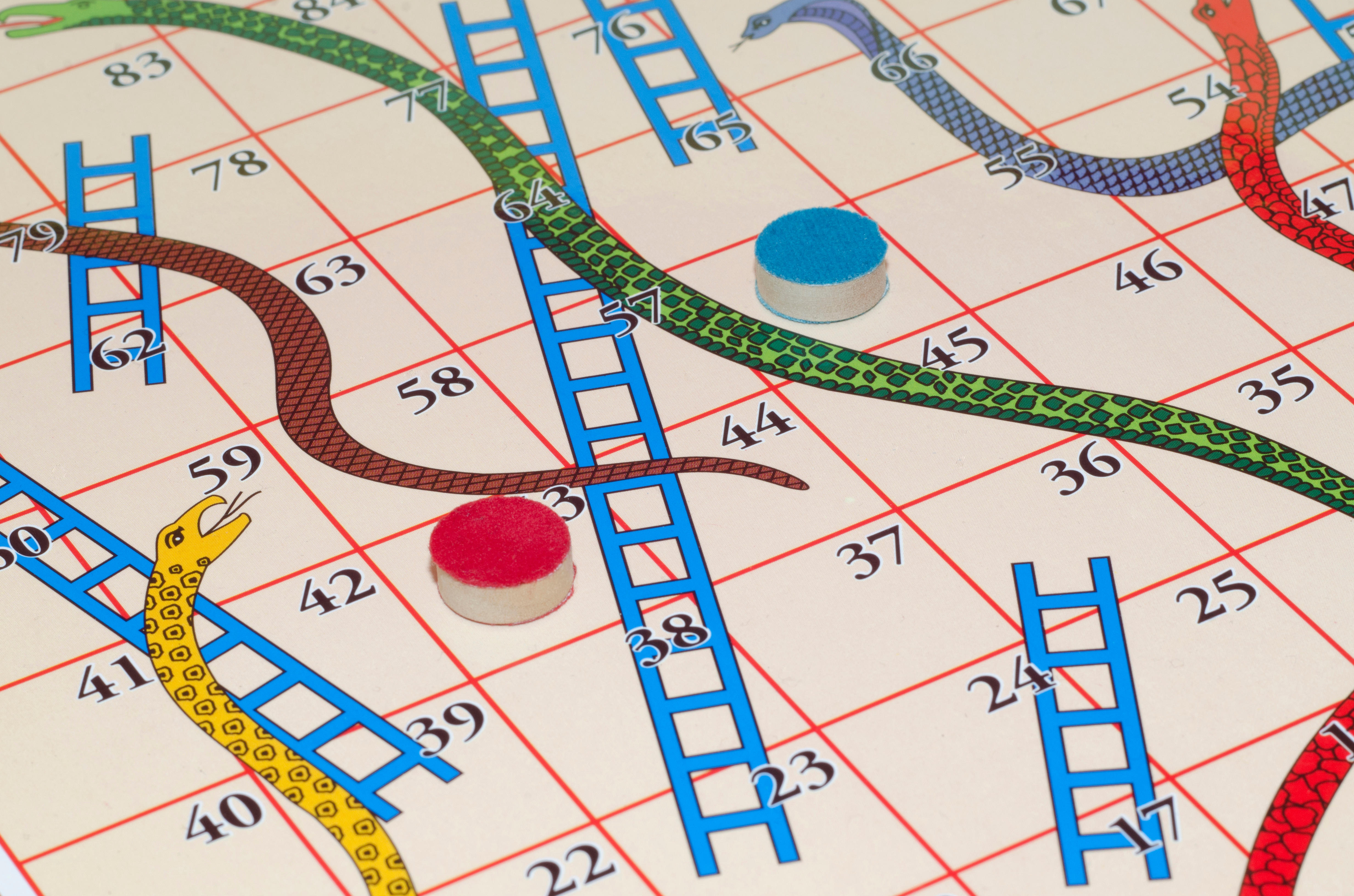Curious questions: Where did the Snakes and Ladders board game come from?
Games of Snakes and Ladder punctuated most of our childhoods, but how many of us know about its Ancient Indian origins and the fact that it was designed to teach us about liberation from the transmutations of karma?


Risk might be an ideal board game for those who fantasise about gaining supreme political power and Monopoly may be beneficial training for anyone wanting to acquire wealth and shed what remains of their morals.
Snakes and Ladders, however, seems to have, on the surface at least, very little to teach us in terms of life skills, either malevolent or benign.
Yet it remains one of the UK’s most popular board games — and, in some ways, it’s not too hard to see why. There’s no manipulation, no skill and no general knowledge required, plus there’s not even any primal cognitive skills needed other than the ability to count and throw a die.
Snakes and Ladders arrived on our shores at some point in the 19th century, when British officers based in India ‘discovered’ the game and brought editions of it back to Blighty. Since then, we’ve done a fairly comprehensive job of eliminating its core spiritual elements.
Absurd as it may sound to our ears, historians contend that Snakes and Ladders was originally designed to teach us about liberation from the transmutations of karma, with the winner being rewarded with moksha; namely emancipation from the endless cycle of death and rebirth.
Known as Moksha Patam, the game in its original form was intended to teach children about the Hindu philosophies of both Karma causality — centred around committing good or bad deeds — and Samskara, which are ritual life events.
The game sounded a lot more sinister back then. The snakes sent players tumbling into the clutches of power-hungry demigods, asuras, whereas the ladders, thankfully, allowed participants to clamber closer to God or one of the Hindu variants of Heaven known as Kailasa, Vaikuntha and Brahmaloka.
Exquisite houses, the beauty of Nature, and how to get the most from your life, straight to your inbox.
The point of Snakes and Ladders, then as now, is that it’s not possible to ‘game’ your way to Heaven. There’s nothing but luck to stand between you and a most unpleasant, or most glorious, destiny.
Therein lies the frustration of the game that has, perhaps unintentionally, recrudesced with modern-day players. How many of us have felt, after a few rounds of shaking the die with the family on a dull Sunday evening, that we may never escape from the endless peril of the serpents that can send us plunging down the board?
Perhaps there is something more elemental going on. Could it be that our more secular interpretations of Snakes and Ladders works (for a brief time, at least) as something of a break from the self-determined fates that more skill-based board games demand of us?
‘I think the simplicity of Snakes and Ladders gives it a universal appeal,’ points out Sam Thompson, a clinical psychologist at St Thomas’s Hospital in London.
‘The lack of skill levels the playing field, allowing anyone to win or lose regardless of their abilities. It gives an outlet for competitiveness, but without any meanness.’
Dr Thompson also believes that the game is ‘a very relatable metaphor’: ‘The ladders represent life’s lucky breaks and the snakes stand for setbacks and misfortunes. Playing the game can help us rehearse these emotional ups and downs in a safe, contained environment. It may even teach us something about acceptance and resilience.’
In its earliest Anglophile guises, versions of the game were, with typical late-Victorian zeal, reinterpreted to teach British children about the futility of attempting to break free from the long arm of the law.
Many versions of Snakes and Ladders from the 1890s feature ‘vices’ being committed on the panels penetrated by the tail of a snake. If your counter landed on the ‘wrong’ part of the board, then it was possible to be greeted with an image of a burly policeman chasing a vagrant down a street with the word ‘stealing’ written in the cloudburst above. Down the snake you went and, perhaps, a stern lesson in probity would also have been absorbed by tyro players.
‘You could say that in a world where we are often pressured to be in control and to strategise, games of pure chance, such as Snakes and Ladders, offer a rare experience of surrender,’ observes Dr Thompson. ‘The lack of control in the game allows us to relinquish responsibility and simply exist in the moment, which can be very therapeutic.’
Whether focused on achieving bliss with the Gods or avoiding bickering with the grandparents, perhaps it’s wise that we should continue to surrender ourselves to the permanence, and the endlessness, of Snakes and Ladders.
Rob is a writer, broadcaster and playwright who lives in Brixton, South London. He regularly contributes to publications including the Daily Mail, Daily Telegraph and Conde Nast Traveller. Rob is the Special Correspondent for the BBC Radio Four programme Feedback and can also be heard on the From Our Own Correspondent programme on BBC Radio Four and the World Service. His first play, 'The Gaffer', premiered at the Underbelly Theatre as part of the Edinburgh Fringe in 2023.
